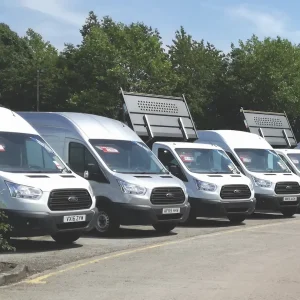 Buying replacement tyres for your van is going to become a lot more like buying a domestic fridge when new regulations come into force in a couple of years time.
Buying replacement tyres for your van is going to become a lot more like buying a domestic fridge when new regulations come into force in a couple of years time.
From 1 November 2012 onwards those tyres will be accompanied by a fridge-style energy efficiency label. It will include a fridge-type A to G rating denoting the tyre’s fuel efficiency — A is the best, G is the worst — as well as ratings for wet grip and noise says Michelin product marketing manager, Steve Dolby.
The noise rating will be shown in decibels along with a pictogram consisting of lines emitting from a loudspeaker symbol. “Three lines are the worst, although it should be stressed that even then the tyre won’t be excessively noisy,” Dolby observes.
When related back to the individual vehicles the tyres are fitted to, the ratings are likely to be no more spot-on accurate than van CO2 figures obtained through bench testing; but at least they provide an indication of the tyre’s likely performance. “It’s something we’re generally in favour of,” says Dolby. “It gives the operator a reason to choose tyres other than price.”
Seasonal
Despite the fact that Britain is heading into summer, Michelin has winter on its mind. It’s busy marketing a cold weather version of its Agilis van tyre under the Agilis Alpin banner which was launched in the UK some nine months ago.
Dolby believes that operators should seriously consider switching to cold weather tyres when ice and snow start to make their presence felt.
While some firms may jib at the expense of keeping two sets of tyres — one for winter, one for summer — others will want to ensure that their vehicles will keep moving when the temperature drops. That’s especially the case with emergency services fleets.
 “The big difference between Alpin and standard Agilis tyres lies in the tread pattern,” says Dolby. “The one Alpin uses is more capable of locking into slippery surfaces and the rubber compound employed is designed to remain supple at very low temperatures.” As a consequence Alpin is less likely to lose grip.
“The big difference between Alpin and standard Agilis tyres lies in the tread pattern,” says Dolby. “The one Alpin uses is more capable of locking into slippery surfaces and the rubber compound employed is designed to remain supple at very low temperatures.” As a consequence Alpin is less likely to lose grip.
Why not use it all year round? “That’s possible, but you will suffer one or two small disadvantages,” he replies. “You may, for example, find that its dry braking performance won’t be quite as good in the summer months as what’s on offer from a standard Agilis tyre,” he continues. “It may not offer quite such good mileage either.”
Storage
 Fast-fit chain ATS Euromaster is encouraging the use of cold weather tyres by offering a special storage and fitting service.
Fast-fit chain ATS Euromaster is encouraging the use of cold weather tyres by offering a special storage and fitting service.
Come October and November it will take off a van’s summer tyres, put them into storage, and fit winter tyres instead. When March and April roll round it will take them off, store them, and re-fit the summer tyres.
Keeping a set of winter tyres on hand is a long-established practice among operators in many European countries and Continental agrees with Michelin that it’s an approach firms on this side of the Channel should consider emulating. A product from the Continental group of companies that is more likely to appeal to many UK businesses than winter tyres given Britain’s rainy climate, however, is Uniroyal’s RainMax 2.
Wet Running
Launched on this side of the Channel last autumn, as its name suggests it’s its wet weather performance that’s one of its key selling points. Its tread is designed to disperse water effectively, leading to a claimed 17 per cent cut in wet braking distance.
With more and more vans being equipped with inflators and sealers rather than spare wheels, it’s perhaps surprising that they’re not being offered with tyres such as Goodyear’s RunOnFlat instead.
Run-Flat
A RunOnFlat tyre will keep working after a puncture, even if fully deflated, thanks to reinforced sidewalls that will support the weight of the vehicle, and help get you to your destination. The tyre’s bead is designed in such a way that in the event of a blow-out it won’t come away from the wheel.
They’re offered as an option on some MPVs says Goodyear, and could probably be offered on certain categories of van too; if operators were willing to pay the extra for them.
“They’re eight to 15 per cent more expensive than standard tyres,” a Goodyear spokesman observes. However, you only need four, not five, he adds; the whole point of them is that a spare isn’t required.
While Michelin, Goodyear and Continental are all familiar long-established brands in the UK, they’re not the only show in town. A number of other reputable names offering good-quality products are making their presence felt here too.
New Players
Based in Korea, but with a European plant in Hungary, Hankook has been supplying Radial RA 28 215/65 R16C tyres to Volkswagen for use on Transporter for over a year. Hankook is also a supplier to Ford and Renault among other manufacturers.
A Japanese brand, Yokohama is attempting to increase its share of the replacement market with a range of van tyres suitable for 14in, 15in and 16in applications. “The feedback we’re getting is that they’re resistant to abuse and customers are reporting some favourable mileage figures,” says UK marketing manager, James Brown.
Also Japanese, Toyo, like Michelin and Continental, is extolling the virtues of winter tyres. Earlier this year it supplied them for use on vans used by skiers from the army’s Royal Logistic Corps who were competing in a championship in wintry Germany.
Maintenance
 Winter or summer, tyres need proper maintenance and the leading fast-fit chains aim to ensure that they get it. ATS Euromaster, for example, is offering businesses operating between five and 50 vehicles free tyre safety checks.
Winter or summer, tyres need proper maintenance and the leading fast-fit chains aim to ensure that they get it. ATS Euromaster, for example, is offering businesses operating between five and 50 vehicles free tyre safety checks.
The inspections cover the depth of the tread and point out where it may be at or below the legal limit. Any tyres which are damaged or punctured are highlighted and the first tyre repair required will be carried out free of charge. The offer is, however, open solely to the first 500 qualifying businesses that contact the firm and is not available to existing customers.
Such inspections can be worthwhile even if you have to pay for them. Run on damaged or bald tyres and you risk being prosecuted, or having an accident, or both.
Also worthwhile is having the phone number of a roadside rescue service ready to hand in case one of your vans has a flat tyre, doesn’t have a spare and the tyre is so badly damaged that the inflator/sealer is ineffective.
“We’ve got over 380 centres and some 1,100 mobiles, so if you’re a customer and you ring one of our centres or our head office number we can usually get someone out to you in an hour-and-a-half,” says head of regional sales, Martyn Pointer. “We generally quote a two-hour response time however; just to be on the safe side.”
The poor state of repair of the roads means that ATS Euromaster’s fitters are seeing more and more damage to wheels and tyres caused by potholes and other defects in the road surface. The inner edges of tyres can suffer as much as the outer edges says Pointer, but the damage may of course not always be noticed; until it is too late.
Tyre Choice
ATS Euromaster is anxious to increase the amount of business it does with smaller fleets and Pointer stresses how valuable the advice it provides can be. “We can take a look at their operation and tell them which tyres they should be using; tyres with thicker sidewalls for instance if they’re on town centre delivery work and their drivers regularly scuff them against kerbs,” he says. Yet another example of the tough life van tyres lead; and one that underlines the need for a proactive approach to tyre maintenance.
Verdict
Tyres are a vehicle’s only contact with the road and must be part of a regular maintenance schedule. Under/over inflated, damaged or illegal boots are a potential disaster waiting to happen. We would also urge those operators in the North of England, Scotland and Wales to seriously consider a different set of tyres for the winter and summer months.





